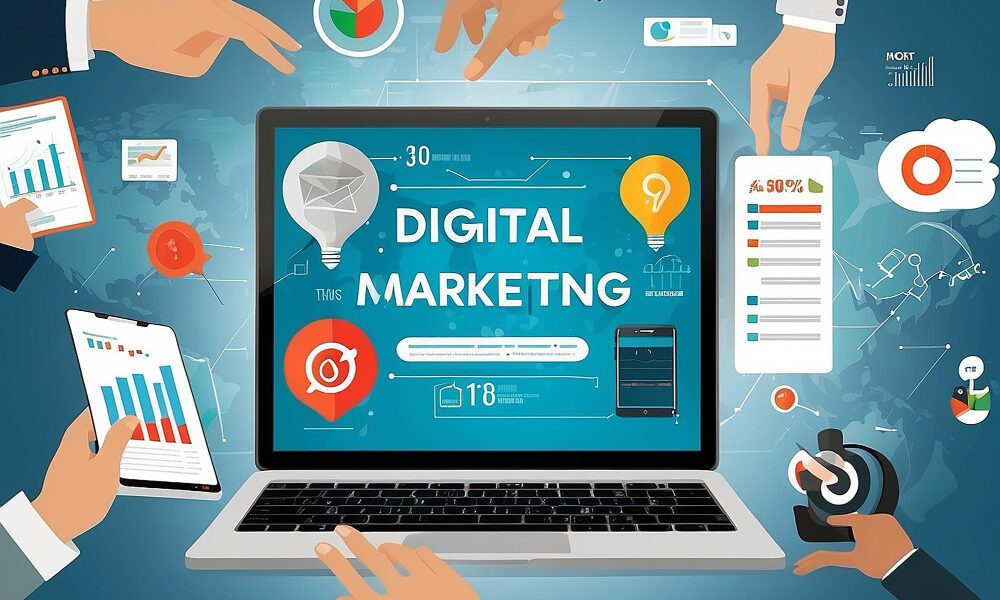Artificial Intelligence (AI) has been revolutionizing various industries, and digital marketing is no exception. As technology coninues to evolve and grow, AI is set to play an even more pivotal role in shaping the future of digital marketing. From personalized customer experiences to data-driven decision-making, AI is speedily transforming how businesses connect with their audiences and optimize their marketing strategies. This article explores the future of AI in digital marketing, highlighting the key trends, benefits, and challenges that lie ahead.
Key Trends in AI-Driven Digital Marketing
- Personalized Customer Experiences: There are many future trends in digital marketing predictions, but personalization is one key that never seems to fade. AI-powered algorithms can quickly and easily analyze vast amounts of data to understand individual customer preferences and behaviors. This crucial tactic enables marketers to deliver highly personalized content, product recommendations, and targeted advertisements. In the future, AI will continue to refine these capabilities, creating even more tailored experiences that resonate with consumers on a deeper level.
- Enhanced Customer Insights: AI and machine learning can process complex data sets to uncover valuable customer insights. Powered by AI, predictive analytics can forecast future trends and behaviors, allowing marketers to anticipate customer needs and proactively address them. This predictive capability will become increasingly sophisticated, enabling more accurate and actionable insights.
- Chatbots and Conversational AI: Chatbots and conversational AI have already made significant strides in customer service and engagement. As AI technology advances, these tools will become more intuitive and more capable of handling complex queries. Future chatbots will provide seamless and human-like interactions, improving customer satisfaction and driving conversions.
- Content Creation and Optimization: AI is revolutionizing content creation by automating tasks such as generating blog posts, social media updates, and video scripts. Natural Language Processing (NLP) algorithms can create content that is both relevant and engaging. Additionally, AI can optimize content for various platforms, ensuring maximum visibility and reach.
- Programmatic Advertising: Programmatic advertising uses AI to automate the buying and selling of ad space in real time. This creates more efficient and effective ad placements, targeting the right audience at exactly the right time. As AI technology progresses, programmatic advertising will become even more precise, reducing ad waste and increasing return on investment (ROI).
- Visual and Voice Search: AI-powered visual and voice search technologies are changing the way people find information online. Visual search allows users to quickly search using images, while voice search enables queries through spoken commands. These technologies will continue to evolve, providing new opportunities for marketers to optimize their content and reach audiences through these innovative search methods.
Benefits of AI in Digital Marketing
- Improved Efficiency: AI automates repetitive and time-consuming tasks, which frees up marketers to focus on strategic planning and creative initiatives. This increased efficiency leads to faster decision-making and execution.
- Enhanced Personalization: AI enables hyper-personalization by analyzing customer data and delivering tailored experiences. This level of personalization drives customer engagement, loyalty, and, ultimately, sales.
- Data-Driven Decisions: AI provides marketers with valuable insights and predictive analytics, enabling data-driven decision-making. This helps to optimize marketing strategies, improve targeting, and maximize ROI.
- Cost Savings: Automation and efficiency gains from AI reduce operational costs. AI-driven tools can optimize ad spend, reduce customer acquisition costs, and improve overall marketing effectiveness.
- Scalability: AI-powered marketing solutions can scale easily to handle large volumes of data and interactions. This essential scalability is perfect for businesses looking to expand their reach and impact.
Challenges of Implementing AI in Digital Marketing
- Data Privacy and Security: The use of AI in digital marketing relies heavily on data collection and analysis. Keeping data private and secure is a critical challenge as consumers become increasingly concerned about how their information is used and protected.
- Integration with Existing Systems: Integrating AI technologies with existing marketing systems and processes can be costly. Businesses of all sizes need to invest in the right infrastructure and training to leverage AI effectively.
- Keeping Up with Rapid Technological Changes: The rapid pace of AI advancements can be overwhelming for marketers. Staying updated with technologies and trends requires continuous learning and adaptation.
- Ethical Considerations: The use of AI raises ethical questions around bias, transparency, and accountability. Marketers must ensure that AI-driven strategies are fair, transparent, and align with ethical standards.
Conclusion
The future of AI in digital marketing is understandably bright, with the potential to revolutionize how businesses engage with their audiences. As AI technology continues to evolve, its role in digital marketing will only become more integral, driving innovation and growth in the industry.




